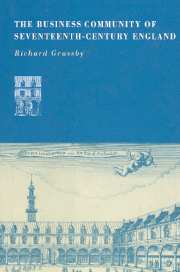Book contents
- Frontmatter
- Contents
- List of figures
- List of tables
- Preface
- List of abbreviations
- Explanatory notes
- Introduction: Questions and sources
- Part 1 Business as a career
- Part 2 Paths to fortune
- Part 3 Life styles
- 9 Religion and ethics
- 10 Family structure
- 11 Consumption and leisure
- 12 A symbiotic culture
- Conclusion: Private enterprise in a pre-industrial economy
- Bibliography
- Index
9 - Religion and ethics
Published online by Cambridge University Press: 02 December 2009
- Frontmatter
- Contents
- List of figures
- List of tables
- Preface
- List of abbreviations
- Explanatory notes
- Introduction: Questions and sources
- Part 1 Business as a career
- Part 2 Paths to fortune
- Part 3 Life styles
- 9 Religion and ethics
- 10 Family structure
- 11 Consumption and leisure
- 12 A symbiotic culture
- Conclusion: Private enterprise in a pre-industrial economy
- Bibliography
- Index
Summary
Business in the seventeenth century was often equated with heresy or irreligion. Traders were suspect because they had both the opportunity and the means to challenge dogma and credulity; they were mobile, selfemployed, literate, individualist, competitive and less wedded to the communal traditions of an agrarian society. Heresy did spread through commerce; although few notable businessmen had been prominent among the Lollards and Protestant martyrs, they may have found it easier to avoid prosecution. Anyone who chose his own path to God put himself at risk. What were the religious affiliations of businessmen and what proportion chose a creed other than that prescribed by the state? How intense were their beliefs and in what ways did they attempt to serve God and avoid sin? How strong was their philanthropic drive and what moral standards did they recognize and follow in their personal lives and in the conduct of their affairs?
Denomination
Business had its quota of Catholics, who were most common in counties heavily populated with Recusants. Children of Catholic landed families which could not afford to grant them annuities had to choose between business, medicine, service in foreign armies, the priesthood or monasteries abroad. Basil Scarisbrick became a merchant, until he inherited the Ecclestone estate, whereas two of his brothers became Jesuits. In Ireland, the Catholic gentry were barred from purchase of land, the Army and the guilds; they either had to emigrate or engage in trade and usury. Recusant merchants usually specialized in trade with Catholic countries, such as Spain and France, where they had an advantage over Protestants who were subject to periodic persecution; they often settled and married abroad and maintained links between the continent and Catholics in England.
- Type
- Chapter
- Information
- The Business Community of Seventeenth-Century England , pp. 271 - 301Publisher: Cambridge University PressPrint publication year: 1995



